Crafting Your Perfect Skin Care Routine: Essential Steps For Radiant Skin
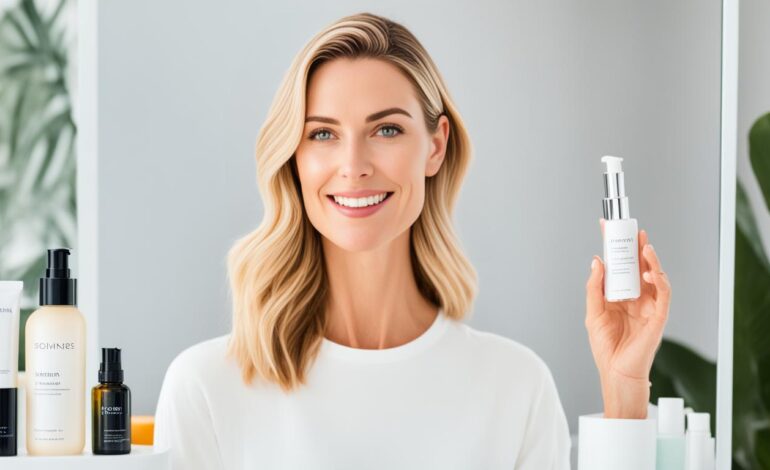
Perfect Skin Care Routine Embarking on a journey to radiant skin is more than just applying random products. It’s about understanding the correct skincare routine, embracing the seven essential steps, and creating a daily ritual that nurtures your skin. In this captivating guide, we’ll unravel the mysteries of skincare, explore the seven steps to a glowing complexion, and introduce must-have products for each step.
Key Takeaways: Perfect Skin Care Routine
- A comprehensive skincare routine involves seven essential steps: cleansing, exfoliating, toning, treating, moisturizing, applying eye cream, and protecting with sunscreen.
- Understanding your unique skin type, whether oily, dry, combination, sensitive, or normal, is crucial for selecting the right products and creating an effective routine.
- Incorporating targeted serums can address specific skin concerns, such as aging, hyperpigmentation, or dehydration.
- Proper ordering and layering of skincare products is essential for maximizing their efficacy and ensuring your skin absorbs the active ingredients effectively.
- Consistent daily practice and adaptability to your skin’s changing needs are key to achieving and maintaining a healthy, radiant complexion.
Understanding Your Skin Type
Identifying your unique skin type is the first step towards creating an effective skincare routine. From oily and dry to combination and sensitive, each skin type has distinct needs and requires tailored products and techniques to maintain a healthy, radiant complexion. By understanding your skin type, you can target your specific concerns and avoid using products that may cause irritation or exacerbate existing issues.
Also Read : Unlock Your Glow: Essential Skin Care Tips For Radiant Complexion
Oily Skin
Those with oily skin types often experience a shiny, greasy appearance throughout the day, along with enlarged pores and a tendency to develop acne breakouts. The key for oily skin is to use oil-controlling, mattifying products that won’t clog pores or contribute to further excess oil production.
Also Read : Pure Beauty: Embracing Organic Skin Care For Radiant Results
Dry Skin
Individuals with dry skin may experience tightness, flakiness, and a dull, rough texture. Dry skin types require hydrating, nourishing formulas that replenish and lock in moisture to combat dehydration and maintain a healthy, supple complexion.
Also Read : Shine Control: Mastering The Art Of Oily Skin Care
Combination Skin
Combination skin is characterized by an oily T-zone (forehead, nose, and chin) and drier cheeks and jawline. This skin type calls for a tailored approach, using mattifying products on the oily areas and hydrating formulas on the drier zones.
Also Read : Best Skin Care Routine For Healthy And Glowing Skin
Sensitive Skin
Sensitive skin is prone to redness, irritation, and reactivity, often due to an impaired skin barrier. Individuals with sensitive skin should opt for gentle, fragrance-free products that avoid harsh ingredients and prioritize soothing and calming the complexion.
Also Read : Timeless Beauty: Effective Skincare For Aging Skin
Perfect Skin Care Routine Embarking on a journey to radiant skin is more than just applying random products. It’s about understanding the correct skincare routine, embracing the seven essential steps, and creating a daily ritual that nurtures your skin. In this captivating guide, we’ll unravel the mysteries of skincare, explore the seven steps to a glowing complexion, and introduce must-have products for each step.
Key Takeaways: Perfect Skin Care Routine
- A comprehensive skincare routine involves seven essential steps: cleansing, exfoliating, toning, treating, moisturizing, applying eye cream, and protecting with sunscreen.
- Understanding your unique skin type, whether oily, dry, combination, sensitive, or normal, is crucial for selecting the right products and creating an effective routine.
- Incorporating targeted serums can address specific skin concerns, such as aging, hyperpigmentation, or dehydration.
- Proper ordering and layering of skincare products is essential for maximizing their efficacy and ensuring your skin absorbs the active ingredients effectively.
- Consistent daily practice and adaptability to your skin’s changing needs are key to achieving and maintaining a healthy, radiant complexion.
Understanding Your Skin Type
Identifying your unique skin type is the first step towards creating an effective skincare routine. From oily and dry to combination and sensitive, each skin type has distinct needs and requires tailored products and techniques to maintain a healthy, radiant complexion. By understanding your skin type, you can target your specific concerns and avoid using products that may cause irritation or exacerbate existing issues.
Also Read : Unlock Your Glow: Essential Skin Care Tips For Radiant Complexion
Oily Skin
Those with oily skin types often experience a shiny, greasy appearance throughout the day, along with enlarged pores and a tendency to develop acne breakouts. The key for oily skin is to use oil-controlling, mattifying products that won’t clog pores or contribute to further excess oil production.
Also Read : Pure Beauty: Embracing Organic Skin Care For Radiant Results
Dry Skin
Individuals with dry skin may experience tightness, flakiness, and a dull, rough texture. Dry skin types require hydrating, nourishing formulas that replenish and lock in moisture to combat dehydration and maintain a healthy, supple complexion.
Also Read : Shine Control: Mastering The Art Of Oily Skin Care
Combination Skin
Combination skin is characterized by an oily T-zone (forehead, nose, and chin) and drier cheeks and jawline. This skin type calls for a tailored approach, using mattifying products on the oily areas and hydrating formulas on the drier zones.
Also Read : Best Skin Care Routine For Healthy And Glowing Skin
Sensitive Skin
Sensitive skin is prone to redness, irritation, and reactivity, often due to an impaired skin barrier. Individuals with sensitive skin should opt for gentle, fragrance-free products that avoid harsh ingredients and prioritize soothing and calming the complexion.
Also Read :
Normal Skin
Those with normal skin enjoy a balanced, healthy complexion with minimal concerns. Normal skin types can typically tolerate a wide range of skincare products and may only require a simple, consistent routine to maintain their radiant glow.
Understanding your unique skin type is essential for selecting the right skincare products and creating a routine that caters to your specific needs. By addressing your skin’s unique characteristics, you can achieve a radiant, well-balanced complexion that exudes confidence and vitality.
Essential Skin Care Products
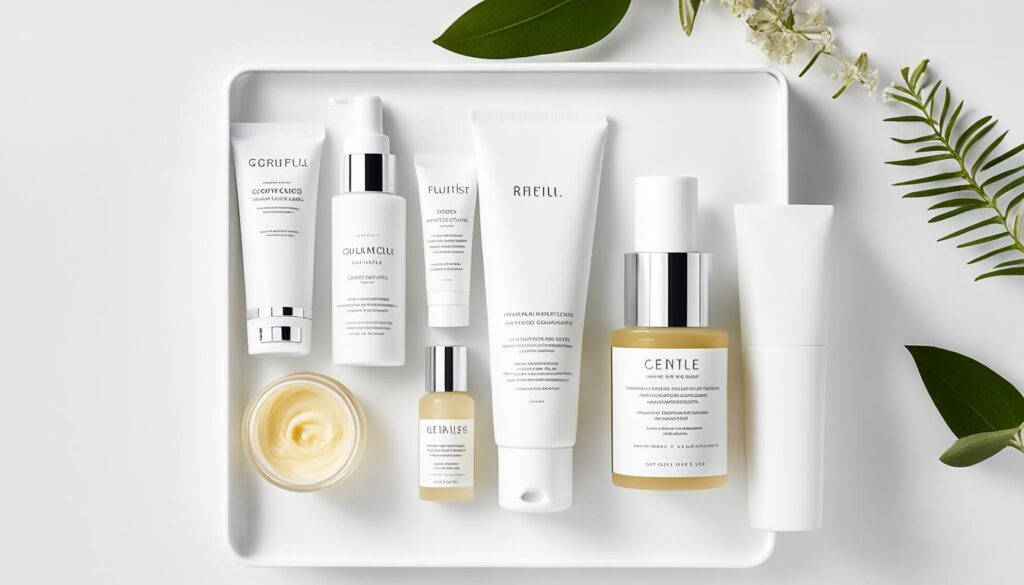
Creating an effective skincare routine involves incorporating a variety of products designed to address specific needs. From cleansers that remove dirt, oil, and makeup to toners that balance the skin’s pH and tighten pores, each step plays a crucial role in achieving radiant, healthy-looking skin.
Cleanser
Cleansers are the foundation of any skincare routine, gently removing impurities and preparing the skin for the subsequent steps. Whether you prefer a creamy, foaming, or micellar formula, choose a cleanser that caters to your skin type and concerns, ensuring a thorough yet non-drying cleanse.
Toner
Toners serve to balance the skin’s pH, tighten pores, and eradicate any lingering impurities. Incorporating a toner into your routine can help optimize your skin’s receptiveness to the products that follow, ensuring maximum efficacy.
Serum
Serums are potent, concentrated formulations that target specific skin concerns, such as aging, hyperpigmentation, or dehydration. By delivering a high concentration of active ingredients directly to the skin, serums can dramatically improve the appearance and health of your complexion.
Moisturizer
Moisturizers are essential for maintaining the skin’s moisture balance and establishing a protective barrier. Whether your skin is dry, oily, or a combination, there’s a moisturizer formulated to address your unique needs and leave your skin feeling soft, supple, and nourished.
Sunscreen
Sunscreens are the unsung heroes of any skincare routine, safeguarding the skin from the harmful effects of UV rays. By applying a broad-spectrum sunscreen daily, you can prevent sun damage, premature aging, and even skin cancer, ensuring your skin stays healthy and radiant.
The Correct Order for Your Skin Care Routine
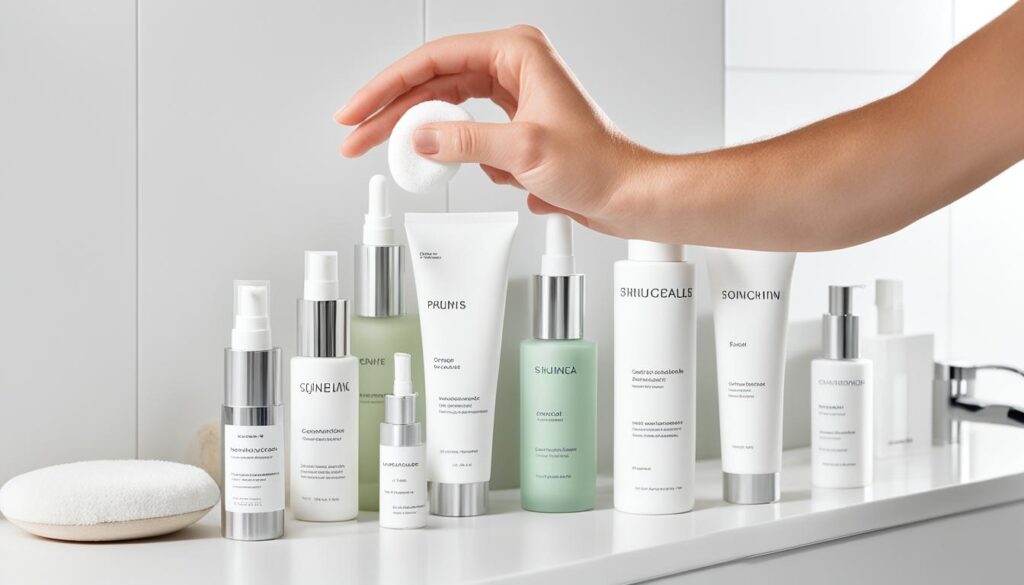
Applying your skin care products in the correct order of skincare is crucial for maximizing their effectiveness. The general guideline is to apply products from thinnest to thickest texture, as thinner products may not be able to penetrate thicker ones. This proper order of skincare ensures optimal absorption and delivery of active ingredients to your skin.
Cleansing
Start your skincare routine steps with cleansing. Use a gentle yet effective skincare routine sequence to remove dirt, oil, and impurities from the surface of your skin. This prepares your skin for the subsequent skincare application order and allows better skincare layering and skincare product order.
Toning
After cleansing, reach for a toner to balance your skin’s pH and further refine your skin care regimen order. Toners help minimize the appearance of pores and ensure your skin care routine steps are absorbed more effectively.
Moisturizing
The final step in your skin care routine order of application is moisturizing. Apply a hydrating formula to lock in moisture and skin care product layering. This step is crucial for maintaining your skin’s skin care routine order importance and skin care routine order benefits.
Skin Care Routine

A good daily skin care routine is like a self-care ritual. Mornings and evenings, follow the seven essential steps consistently: cleanse, exfoliate, tone, treat, moisturize, apply eye cream, and protect with sunscreen. Listen to your skin, adapt when needed, and revel in the joy of nurturing your skin with these simple yet impactful steps.
Developing a personalized skin care routine can be transformative, helping you address your unique skin care concerns and achieve a radiant, healthy complexion. Whether you have oily, dry, combination, or sensitive skin, a customized skin care routine tailored to your needs can make a significant difference in the way your skin looks and feels.
Consistency is key when it comes to an effective skin care routine. Incorporate these seven essential steps into your morning and night skin care routines for maximum benefits. By following a complete skin care routine diligently, you can expect to see improvements in your skin’s texture, tone, and overall appearance.
Remember, your skin care routine is a journey, not a destination. Continuously assess your skin care needs and adjust your routine accordingly. Embrace the process of discovering the right skin care products and techniques that work best for your unique skin type and concerns.
| Skin Care Routine Steps | Morning | Evening |
|---|---|---|
| Cleanse | ✓ | ✓ |
| Exfoliate | ✓ | |
| Tone | ✓ | ✓ |
| Treat (Serum) | ✓ | ✓ |
| Moisturize | ✓ | ✓ |
| Eye Cream | ✓ | ✓ |
| Sunscreen | ✓ |
Embrace the power of a consistent, personalized skin care routine and witness the transformative effects on your skin’s health, radiance, and overall well-being.
Exfoliation: Unveiling Radiant Skin
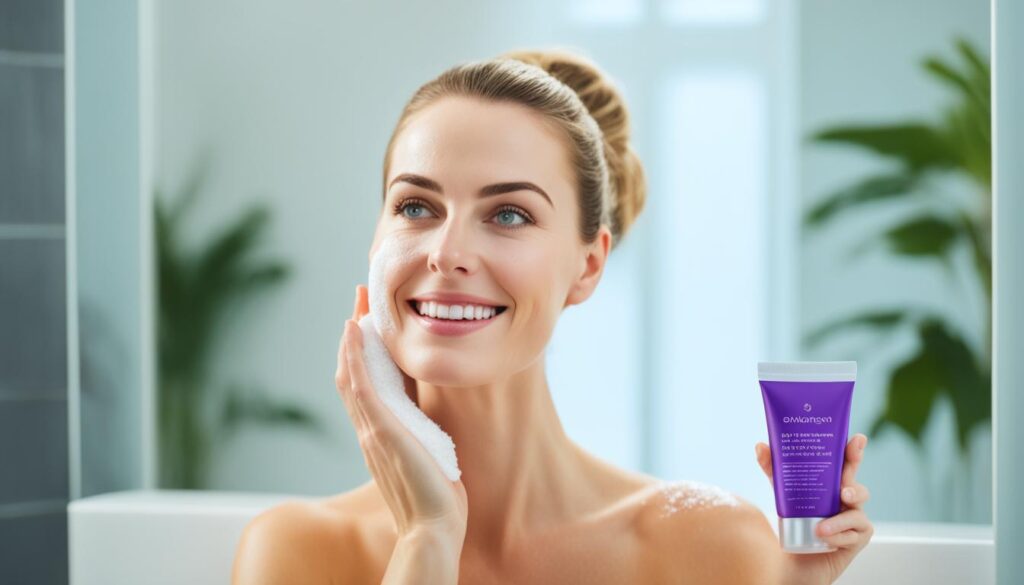
Exfoliation is a vital step in any comprehensive skin care routine, helping to remove dead skin cells, unclog pores, and promote cell renewal for a brighter, smoother complexion. There are two primary types of exfoliants to consider: physical exfoliants and chemical exfoliants.
Physical Exfoliants
Physical exfoliants, such as exfoliating scrubs, exfoliating brushes, and other exfoliating tools, work by physically removing the outermost layer of the skin. These mechanical exfoliants utilize ingredients like ground-up walnut shells, sugar, or microbeads to gently slough off dead skin cells. Physical exfoliation can be an effective way to improve skin texture and promote a radiant glow, but it’s essential to use these products with caution, as overzealous scrubbing can irritate the skin.
Chemical Exfoliants
In contrast, chemical exfoliants utilize alpha hydroxy acids (AHAs) and beta hydroxy acids (BHAs) to break down the bonds between dead skin cells, allowing them to shed more effectively. These exfoliating ingredients can address a variety of skin concerns, from acne and hyperpigmentation to fine lines and rough texture. Examples of chemical exfoliants include glycolic acid, lactic acid, and salicylic acid. It’s crucial to introduce chemical exfoliants gradually and to adjust the frequency based on your skin type and skin concerns.
Incorporating both physical and chemical exfoliation into your skin care routine can provide a comprehensive approach to unveiling radiant, renewed skin. By balancing these exfoliating techniques, you can address a wide range of skin concerns and achieve a healthy, glowing complexion.
Serums: Targeted Treatment
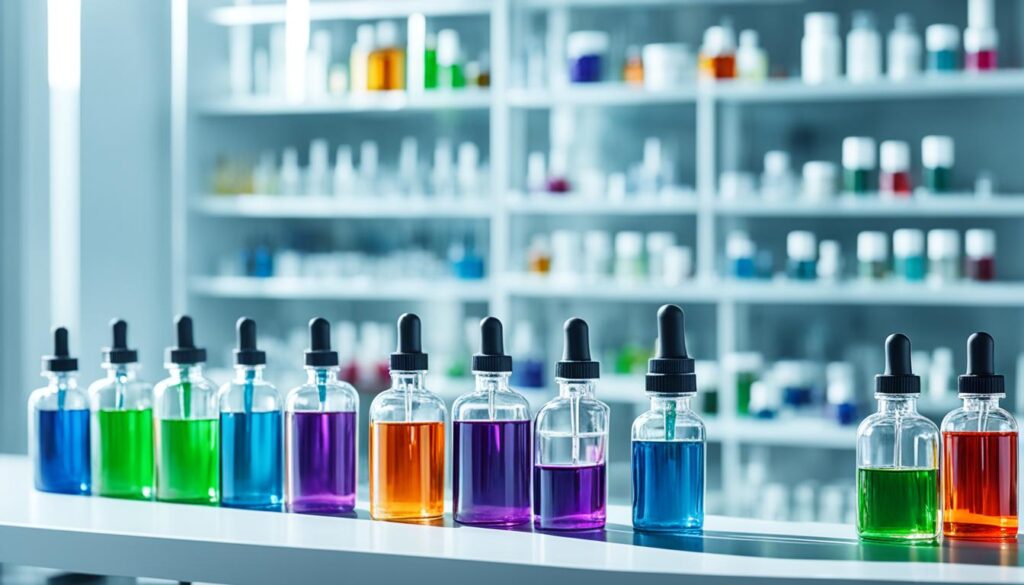
Serums are potent skincare formulations designed to target specific skin concerns, such as fine lines, dark spots, or dehydration. By incorporating a serum into your routine, you can address these issues with a concentrated and highly effective dose of active ingredients.
Antioxidant Serums
Antioxidant serums are formulated to protect the skin from environmental stressors and free radical damage. These serums often contain ingredients like vitamin C, vitamin E, or green tea, which help to neutralize harmful free radicals and promote a more radiant, youthful-looking complexion. Incorporating an antioxidant serum into your routine can help to prevent premature aging, improve skin texture, and enhance overall skin health.
Brightening Serums
Brightening serums are designed to address issues like hyperpigmentation, dark spots, and uneven skin tone. These serums typically contain ingredients such as niacinamide, licorice root extract, or kojic acid, which work to inhibit the production of melanin and promote a more even, luminous complexion. Regular use of a brightening serum can help to fade discoloration and reveal a brighter, more radiant-looking skin.
Anti-Aging Serums
Anti-aging serums are formulated to target the visible signs of aging, such as fine lines, wrinkles, and loss of firmness. These serums often contain retinol, peptides, or hyaluronic acid, which help to stimulate collagen production, reduce the appearance of wrinkles, and improve skin elasticity. Incorporating an anti-aging serum into your routine can help to counteract the effects of aging and maintain a more youthful, rejuvenated complexion.
Masking: Nourishing Your Complexion
Face masks are a powerful tool in any skincare regimen, offering a concentrated dose of nourishment and targeted treatment for your skin. From deeply cleansing clay masks to hydrating sheet masks and overnight masks that work while you sleep, the world of masking provides a plethora of options to address various skin concerns.
Clay Masks
Clay masks are renowned for their ability to deeply cleanse the skin, drawing out impurities and excess oil. These masks are particularly beneficial for those with oily or acne-prone skin, as they help to mattify the complexion and minimize the appearance of pores. When used regularly, clay masks can help improve skin texture and clarity, leaving you with a radiant, refined glow.
Sheet Masks
Sheet masks, often infused with a potent serum, deliver a concentrated burst of hydration and nourishment to the skin. These user-friendly masks are designed to be applied for a specific duration, allowing the skin to fully absorb the beneficial ingredients. Whether you’re seeking to brighten, soothe, or plump the skin, there’s a sheet mask formulation to meet your needs.
Overnight Masks
Overnight masks are the ultimate multitaskers, working their magic while you sleep. These intensely hydrating and rejuvenating formulas are designed to deeply nourish the skin, promoting cell renewal and locking in moisture. Wake up to a refreshed, glowing complexion that looks and feels revitalized. Incorporating an overnight mask into your weekly routine can be a game-changer for achieving optimal skin health.
Also Read: Skincare Routine For Dry And Sensitive Skin
Conclusion
Crafting your perfect skincare routine is a journey of self-discovery and empowerment, where each step becomes a mindful act of nurturing and self-care. Through careful selection and application of essential products tailored to your skin’s unique needs, you embark on a path towards radiant and healthy skin. The process involves not just following a set of steps but understanding your skin deeply—its type, concerns, and sensitivities. As you integrate cleansing, nourishing, and protecting into your daily regimen, you weave a tapestry of beauty that reflects not only on the surface but emanates from within. Consistency becomes your ally, as you commit to your routine with dedication and patience, knowing that true transformation takes time. With each application, you not only pamper your skin but also cultivate a sense of self-love and confidence that radiates beyond mere appearance.
Furthermore, crafting your perfect skincare routine is an act of self-expression, where you curate a ritual that resonates with your values and beliefs. Whether you opt for natural, organic products or innovative skincare technology, your routine becomes a reflection of your commitment to personal well-being and authenticity. As you bask in the glow of radiant skin, you embody the essence of beauty that is not just skin deep but rooted in self-awareness, care, and appreciation for the remarkable vessel that is your body.
FAQs
Q: What are the essential steps for a morning skin care routine?
A: In the morning, start by cleansing your skin to remove any impurities. Follow up with a toner to balance the skin’s pH level. Next, apply a serum with active ingredients like retinol or vitamin C to target specific skin concerns. Finish off with a moisturizer to hydrate and protect your skin throughout the day.
Q: How can I protect my skin from damage during the day?
A: To protect your skin during the day, ensure you apply a broad-spectrum sunscreen with at least SPF 30. This will shield your skin from harmful UV rays that can cause premature aging and damage.
Q: What is the best order to apply skin care products?
A: When applying skin care products, it’s generally recommended to start with the thinnest consistency and move to thicker products. This means applying products like serums before moisturizers to ensure maximum absorption and effectiveness.
Q: How do I create a basic skin care routine?
A: A basic skin care routine should include cleansing, moisturizing, and sun protection. Choose products that suit your skin type and concerns, and consistently follow this routine both morning and night for healthier skin.
Q: Can using the wrong products in my skin care routine irritate my skin?
A: Yes, using products that are not suitable for your skin type or contain harsh ingredients can irritate your skin and lead to issues like redness, dryness, or breakouts. Always choose products that are gentle and formulated for your specific skin needs.
Q: How does a morning skin care routine differ from a nighttime routine?
A: A morning skin care routine typically focuses on protecting and preparing the skin for the day ahead, including SPF application. In contrast, a nighttime routine prioritizes repairing and renewing the skin while you sleep, often involving treatments like retinol or hydrating masks.
Q: What should I do if my skin feels dry after following my skin care routine?
A: If your skin feels dry after your routine, you may need to incorporate a hydrating serum or richer moisturizer into your regimen. Additionally, ensure you are not over-cleansing, as this can strip the skin of its natural oils and cause dryness.
Source Links
- https://www.earlyherbs.com/blogs/earlyherbs/the-complete-guide-to-crafting-your-perfect-skin-care-routine-tips-products-and-techniques-for-a-radiant-complexion
- https://medium.com/@marilynsibx/unveiling-the-secrets-crafting-your-perfect-7-step-skincare-routine-for-radiant-skin-d6865391d0ad
- https://www.belorens.com/blog/skincare-routine-full-guide/
Normal Skin
Those with normal skin enjoy a balanced, healthy complexion with minimal concerns. Normal skin types can typically tolerate a wide range of skincare products and may only require a simple, consistent routine to maintain their radiant glow.
Understanding your unique skin type is essential for selecting the right skincare products and creating a routine that caters to your specific needs. By addressing your skin’s unique characteristics, you can achieve a radiant, well-balanced complexion that exudes confidence and vitality.
Essential Skin Care Products

Creating an effective skincare routine involves incorporating a variety of products designed to address specific needs. From cleansers that remove dirt, oil, and makeup to toners that balance the skin’s pH and tighten pores, each step plays a crucial role in achieving radiant, healthy-looking skin.
Cleanser
Cleansers are the foundation of any skincare routine, gently removing impurities and preparing the skin for the subsequent steps. Whether you prefer a creamy, foaming, or micellar formula, choose a cleanser that caters to your skin type and concerns, ensuring a thorough yet non-drying cleanse.
Toner
Toners serve to balance the skin’s pH, tighten pores, and eradicate any lingering impurities. Incorporating a toner into your routine can help optimize your skin’s receptiveness to the products that follow, ensuring maximum efficacy.
Serum
Serums are potent, concentrated formulations that target specific skin concerns, such as aging, hyperpigmentation, or dehydration. By delivering a high concentration of active ingredients directly to the skin, serums can dramatically improve the appearance and health of your complexion.
Moisturizer
Moisturizers are essential for maintaining the skin’s moisture balance and establishing a protective barrier. Whether your skin is dry, oily, or a combination, there’s a moisturizer formulated to address your unique needs and leave your skin feeling soft, supple, and nourished.
Sunscreen
Sunscreens are the unsung heroes of any skincare routine, safeguarding the skin from the harmful effects of UV rays. By applying a broad-spectrum sunscreen daily, you can prevent sun damage, premature aging, and even skin cancer, ensuring your skin stays healthy and radiant.
The Correct Order for Your Skin Care Routine

Applying your skin care products in the correct order of skincare is crucial for maximizing their effectiveness. The general guideline is to apply products from thinnest to thickest texture, as thinner products may not be able to penetrate thicker ones. This proper order of skincare ensures optimal absorption and delivery of active ingredients to your skin.
Cleansing
Start your skincare routine steps with cleansing. Use a gentle yet effective skincare routine sequence to remove dirt, oil, and impurities from the surface of your skin. This prepares your skin for the subsequent skincare application order and allows better skincare layering and skincare product order.
Toning
After cleansing, reach for a toner to balance your skin’s pH and further refine your skin care regimen order. Toners help minimize the appearance of pores and ensure your skin care routine steps are absorbed more effectively.
Moisturizing
The final step in your skin care routine order of application is moisturizing. Apply a hydrating formula to lock in moisture and skin care product layering. This step is crucial for maintaining your skin’s skin care routine order importance and skin care routine order benefits.
Skin Care Routine

A good daily skin care routine is like a self-care ritual. Mornings and evenings, follow the seven essential steps consistently: cleanse, exfoliate, tone, treat, moisturize, apply eye cream, and protect with sunscreen. Listen to your skin, adapt when needed, and revel in the joy of nurturing your skin with these simple yet impactful steps.
Developing a personalized skin care routine can be transformative, helping you address your unique skin care concerns and achieve a radiant, healthy complexion. Whether you have oily, dry, combination, or sensitive skin, a customized skin care routine tailored to your needs can make a significant difference in the way your skin looks and feels.
Consistency is key when it comes to an effective skin care routine. Incorporate these seven essential steps into your morning and night skin care routines for maximum benefits. By following a complete skin care routine diligently, you can expect to see improvements in your skin’s texture, tone, and overall appearance.
Remember, your skin care routine is a journey, not a destination. Continuously assess your skin care needs and adjust your routine accordingly. Embrace the process of discovering the right skin care products and techniques that work best for your unique skin type and concerns.
| Skin Care Routine Steps | Morning | Evening |
|---|---|---|
| Cleanse | ✓ | ✓ |
| Exfoliate | ✓ | |
| Tone | ✓ | ✓ |
| Treat (Serum) | ✓ | ✓ |
| Moisturize | ✓ | ✓ |
| Eye Cream | ✓ | ✓ |
| Sunscreen | ✓ |
Embrace the power of a consistent, personalized skin care routine and witness the transformative effects on your skin’s health, radiance, and overall well-being.
Exfoliation: Unveiling Radiant Skin

Exfoliation is a vital step in any comprehensive skin care routine, helping to remove dead skin cells, unclog pores, and promote cell renewal for a brighter, smoother complexion. There are two primary types of exfoliants to consider: physical exfoliants and chemical exfoliants.
Physical Exfoliants
Physical exfoliants, such as exfoliating scrubs, exfoliating brushes, and other exfoliating tools, work by physically removing the outermost layer of the skin. These mechanical exfoliants utilize ingredients like ground-up walnut shells, sugar, or microbeads to gently slough off dead skin cells. Physical exfoliation can be an effective way to improve skin texture and promote a radiant glow, but it’s essential to use these products with caution, as overzealous scrubbing can irritate the skin.
Chemical Exfoliants
In contrast, chemical exfoliants utilize alpha hydroxy acids (AHAs) and beta hydroxy acids (BHAs) to break down the bonds between dead skin cells, allowing them to shed more effectively. These exfoliating ingredients can address a variety of skin concerns, from acne and hyperpigmentation to fine lines and rough texture. Examples of chemical exfoliants include glycolic acid, lactic acid, and salicylic acid. It’s crucial to introduce chemical exfoliants gradually and to adjust the frequency based on your skin type and skin concerns.
Incorporating both physical and chemical exfoliation into your skin care routine can provide a comprehensive approach to unveiling radiant, renewed skin. By balancing these exfoliating techniques, you can address a wide range of skin concerns and achieve a healthy, glowing complexion.
Serums: Targeted Treatment

Serums are potent skincare formulations designed to target specific skin concerns, such as fine lines, dark spots, or dehydration. By incorporating a serum into your routine, you can address these issues with a concentrated and highly effective dose of active ingredients.
Antioxidant Serums
Antioxidant serums are formulated to protect the skin from environmental stressors and free radical damage. These serums often contain ingredients like vitamin C, vitamin E, or green tea, which help to neutralize harmful free radicals and promote a more radiant, youthful-looking complexion. Incorporating an antioxidant serum into your routine can help to prevent premature aging, improve skin texture, and enhance overall skin health.
Brightening Serums
Brightening serums are designed to address issues like hyperpigmentation, dark spots, and uneven skin tone. These serums typically contain ingredients such as niacinamide, licorice root extract, or kojic acid, which work to inhibit the production of melanin and promote a more even, luminous complexion. Regular use of a brightening serum can help to fade discoloration and reveal a brighter, more radiant-looking skin.
Anti-Aging Serums
Anti-aging serums are formulated to target the visible signs of aging, such as fine lines, wrinkles, and loss of firmness. These serums often contain retinol, peptides, or hyaluronic acid, which help to stimulate collagen production, reduce the appearance of wrinkles, and improve skin elasticity. Incorporating an anti-aging serum into your routine can help to counteract the effects of aging and maintain a more youthful, rejuvenated complexion.
Masking: Nourishing Your Complexion
Face masks are a powerful tool in any skincare regimen, offering a concentrated dose of nourishment and targeted treatment for your skin. From deeply cleansing clay masks to hydrating sheet masks and overnight masks that work while you sleep, the world of masking provides a plethora of options to address various skin concerns.
Clay Masks
Clay masks are renowned for their ability to deeply cleanse the skin, drawing out impurities and excess oil. These masks are particularly beneficial for those with oily or acne-prone skin, as they help to mattify the complexion and minimize the appearance of pores. When used regularly, clay masks can help improve skin texture and clarity, leaving you with a radiant, refined glow.
Sheet Masks
Sheet masks, often infused with a potent serum, deliver a concentrated burst of hydration and nourishment to the skin. These user-friendly masks are designed to be applied for a specific duration, allowing the skin to fully absorb the beneficial ingredients. Whether you’re seeking to brighten, soothe, or plump the skin, there’s a sheet mask formulation to meet your needs.
Overnight Masks
Overnight masks are the ultimate multitaskers, working their magic while you sleep. These intensely hydrating and rejuvenating formulas are designed to deeply nourish the skin, promoting cell renewal and locking in moisture. Wake up to a refreshed, glowing complexion that looks and feels revitalized. Incorporating an overnight mask into your weekly routine can be a game-changer for achieving optimal skin health.
Also Read: Skincare Routine For Dry And Sensitive Skin
Conclusion
Crafting your perfect skincare routine is a journey of self-discovery and empowerment, where each step becomes a mindful act of nurturing and self-care. Through careful selection and application of essential products tailored to your skin’s unique needs, you embark on a path towards radiant and healthy skin. The process involves not just following a set of steps but understanding your skin deeply—its type, concerns, and sensitivities. As you integrate cleansing, nourishing, and protecting into your daily regimen, you weave a tapestry of beauty that reflects not only on the surface but emanates from within. Consistency becomes your ally, as you commit to your routine with dedication and patience, knowing that true transformation takes time. With each application, you not only pamper your skin but also cultivate a sense of self-love and confidence that radiates beyond mere appearance.
Furthermore, crafting your perfect skincare routine is an act of self-expression, where you curate a ritual that resonates with your values and beliefs. Whether you opt for natural, organic products or innovative skincare technology, your routine becomes a reflection of your commitment to personal well-being and authenticity. As you bask in the glow of radiant skin, you embody the essence of beauty that is not just skin deep but rooted in self-awareness, care, and appreciation for the remarkable vessel that is your body.
FAQs
Q: What are the essential steps for a morning skin care routine?
A: In the morning, start by cleansing your skin to remove any impurities. Follow up with a toner to balance the skin’s pH level. Next, apply a serum with active ingredients like retinol or vitamin C to target specific skin concerns. Finish off with a moisturizer to hydrate and protect your skin throughout the day.
Q: How can I protect my skin from damage during the day?
A: To protect your skin during the day, ensure you apply a broad-spectrum sunscreen with at least SPF 30. This will shield your skin from harmful UV rays that can cause premature aging and damage.
Q: What is the best order to apply skin care products?
A: When applying skin care products, it’s generally recommended to start with the thinnest consistency and move to thicker products. This means applying products like serums before moisturizers to ensure maximum absorption and effectiveness.
Q: How do I create a basic skin care routine?
A: A basic skin care routine should include cleansing, moisturizing, and sun protection. Choose products that suit your skin type and concerns, and consistently follow this routine both morning and night for healthier skin.
Q: Can using the wrong products in my skin care routine irritate my skin?
A: Yes, using products that are not suitable for your skin type or contain harsh ingredients can irritate your skin and lead to issues like redness, dryness, or breakouts. Always choose products that are gentle and formulated for your specific skin needs.
Q: How does a morning skin care routine differ from a nighttime routine?
A: A morning skin care routine typically focuses on protecting and preparing the skin for the day ahead, including SPF application. In contrast, a nighttime routine prioritizes repairing and renewing the skin while you sleep, often involving treatments like retinol or hydrating masks.
Q: What should I do if my skin feels dry after following my skin care routine?
A: If your skin feels dry after your routine, you may need to incorporate a hydrating serum or richer moisturizer into your regimen. Additionally, ensure you are not over-cleansing, as this can strip the skin of its natural oils and cause dryness.
Source Links
- https://www.earlyherbs.com/blogs/earlyherbs/the-complete-guide-to-crafting-your-perfect-skin-care-routine-tips-products-and-techniques-for-a-radiant-complexion
- https://medium.com/@marilynsibx/unveiling-the-secrets-crafting-your-perfect-7-step-skincare-routine-for-radiant-skin-d6865391d0ad
- https://www.belorens.com/blog/skincare-routine-full-guide/
